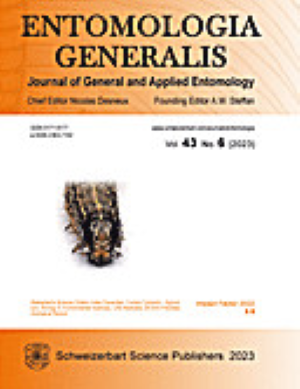Edible insects: an overview on farming, from processing procedures to environmental impact, with a glimpse to traditional recipes and to future cultured meat
IF 4.6
1区 农林科学
Q1 ENTOMOLOGY
引用次数: 0
Abstract
In the last decade, the use of insects has grown globally in relation to all sectors of the food chain. Insect farming offers a sustainable alternative to conventional livestock production, with lower environmental impacts and efficient resource use, as shown by Life Cycle Assessments (LCA). However, challenges in scaling production, standardizing processes, and addressing regulatory gaps remain. Continued research and collaboration are essential to fully realize the potential of insects as a sustainable protein source for human consumption. This review analyses some elements related to insect consumption, from the aspects of the hygiene, the different breeding and environmental impact to the description of the processing techniques, also providing the reader with some practical examples related to some world-famous recipes to offer an idea of how insects are perceived as food. The methods used in the processing of edible insects are critical to improving their nutritional content, safety, and palatability. The acceptance of insect-based cuisine can be increased by incorporating insects into traditional foods, thereby minimizing reactions of disgust. In addition, a look to the near future examines the possibilities of cultured meat made from insect cells, which presents encouraging paths toward the creation of sustainable protein, offering a revolutionary strategy that will transform future food production systems toward efficiency and sustainability. This is an absolutely innovative aspect for the production of edible proteins.食用昆虫:从加工程序到环境影响的养殖概述,以及传统食谱和未来养殖肉类的一瞥
在过去十年中,昆虫的使用在全球范围内不断增长,涉及食物链的各个环节。正如生命周期评估(LCA)所示,昆虫养殖是传统畜牧业生产的可持续替代品,对环境的影响较小,资源利用效率高。然而,在扩大生产规模、实现流程标准化和解决监管漏洞方面仍然存在挑战。要充分发挥昆虫作为人类消费的可持续蛋白质来源的潜力,就必须继续开展研究与合作。这篇综述分析了与昆虫消费有关的一些要素,从卫生、不同养殖和环境影响等方面到加工技术的描述,还为读者提供了一些与世界著名食谱有关的实际例子,让读者了解昆虫是如何被视为食物的。食用昆虫的加工方法对于提高其营养成分、安全性和适口性至关重要。将昆虫融入传统食物中,可以提高人们对以昆虫为原料的美食的接受度,从而将人们的反感反应降至最低。此外,展望不久的将来,昆虫细胞培养肉类的可能性也会得到研究,这为创造可持续蛋白质提供了令人鼓舞的途径,提供了一种革命性的战略,将改变未来的食品生产系统,使其朝着高效和可持续的方向发展。这绝对是生产可食用蛋白质的一个创新方面。
本文章由计算机程序翻译,如有差异,请以英文原文为准。
求助全文
约1分钟内获得全文
求助全文
来源期刊

Entomologia Generalis
生物-昆虫学
CiteScore
7.10
自引率
18.80%
发文量
72
审稿时长
>12 weeks
期刊介绍:
Its scope covers all aspects of basic and applied research dealing with insects and more broadly with arthropods inhabiting wild, agricultural and/or urban habitats. The journal also considers research integrating various disciplines and issues within the broad field of entomology and ecology.
Entomologia Generalis publishes high quality research articles on advances in knowledge on the ecology and biology of arthropods, as well as on their importance for key ecosystems services, e.g. as biological control and pollination. The journal devotes special attention to contributions providing significant advances (i) on the fundamental knowledge and on sustainable control strategies of arthropod pests (including of stored products) and vectors of diseases, (ii) on the biology and ecology of beneficial arthropods, (iii) on the spread and impact of invasive pests, and (iv) on potential side effects of pest management methods.
Entomologia Generalis welcomes review articles on significant developments in the field of entomology. These are usually invited by the editorial board, but proposals may be sent to the Editor-in-Chief for preliminary assessment by the editorial board before formal submission to the journal. The journal also considers comments on papers published in Entomologia Generalis, as well as short notes on topics that are of broader interest.
 求助内容:
求助内容: 应助结果提醒方式:
应助结果提醒方式:


